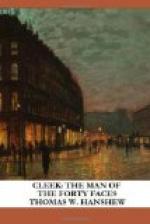He had made good use of the two half-crowns, for he had not only feasted—and was feasting still: on a bag of winkles and a saveloy—but was washed and brushed and had gone to the length of a shoe-shine and a collar.
“Been waitin’ since eleven o’clock, sir,” he said, getting up and pulling his forelock as Cleek appeared. “Didn’t knock and arsk for no one, though—not me. Twigged as it would be you, sir, on account of your sayin’ to-night. I’ve read summink of the ways of ’tecs. Wot ho!”
“You seem a sharp little customer, at all events,” said Cleek with a curious one-sided smile—a smile that was peculiar to him. “I somehow fancy that I’ve made a good investment, Dollops. Filled up, eh?”
“No, sir—never filled. Born ’ungry, I reckon. But filled as much as you could fill me, bless your ‘eart. I aren’t never goin’ to forget that, Gov’nor—no fear. An eater and a scrapper I am, sir; and I’ll scrap for you, sir, while there’s a bloomin’ breff left in my blessed body! Gimme the tip wot kind of work I can do for you, Gov’nor, will you? I want to get them two ’arf-crowns off my conscience as quick as I can.”
Cleek looked at him and smiled again.
“Yes, I’m sure I made a good bargain, Dollops,” he said. “Come in.” And in this way the attachment which existed between them ever afterward had its beginning.
He took the boy in and up to the little room on the second floor which he called his den; and, turning on the light, motioned him to a chair, laid aside his hat and gloves, and was just about to pull up a chair for himself when he caught sight of an unstamped letter lying upon his writing-table.
“Sit down there and wait a moment until I read this, my lad,” he said; and forthwith tore the letter open.
It was from Superintendent Narkom. He had known that from the first, however. No one but Narkom ever wrote him letters. This one was exceedingly brief. It simply contained these two lines:
“My dear Cleek. The Three Jolly Fishermen, Richmond, at tea-time to-morrow. An astonishing affair. Yours, M. N.”
“Dollops, my lad, I think I’m going to make a man of you,” he said as he tore the letter into a dozen pieces and tossed the fragments into a waste-basket. “At any rate, I’m going to have a try. Know anything about Richmond?”
“Yuss, sir.”
“Good. Well, we’ll have a half-hour’s talk and then I’ll find a temporary bed for you for the night, and to-morrow we’ll take a pull on the river at Richmond and see what we shall see.”
The half-hour, however, developed into a full one; for it was after two o’clock when the talk was finished and a bed improvised for the boy; but Cleek, saying good night to him at last and going to his own bedroom, felt that it was a long, long way from being time wasted.
What Dollops thought is, perhaps, best told by the fact that he burst out crying when Cleek came in in the morning to ask how he had slept.




